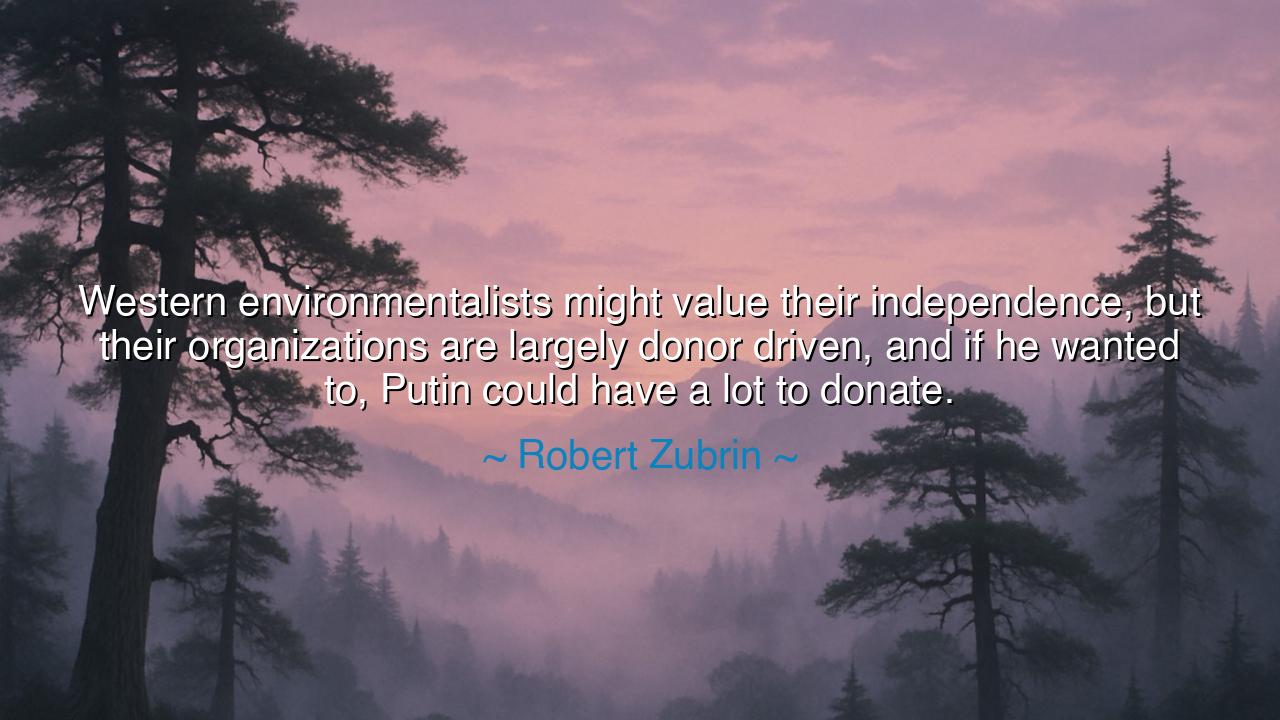
Western environmentalists might value their independence, but
Western environmentalists might value their independence, but their organizations are largely donor driven, and if he wanted to, Putin could have a lot to donate.






“Western environmentalists might value their independence, but their organizations are largely donor driven, and if he wanted to, Putin could have a lot to donate.” Thus spoke Robert Zubrin, a thinker of the modern world, who sought to pierce the veil of comfort and reveal a truth both ancient and unsettling — that the hands which feed often hold invisible chains. His words strike at the heart of a timeless struggle: the battle between principle and influence, between the purity of conviction and the corruption of dependence. It is a warning whispered through the ages — that those who fight for good must guard not only their cause, but the integrity of their will.
For what is independence if one’s path is subtly steered by unseen benefactors? What is virtue if its course can be purchased? The ancients knew that gold, though cold and lifeless, could enslave the warmest hearts. The Greeks told of King Midas, whose greed for gold turned all he loved to stone. The same curse, Zubrin warns, can befall movements that begin with fire but end in servitude to the wealth that sustains them. For even noble causes can be twisted when their survival depends not on the truth they speak, but on the comfort of those who pay for the speaking.
Zubrin’s warning finds its form in the modern struggle for environmental preservation. Many among the Western lands labor to protect the Earth — the forests, the seas, the fragile balance of life. Their banners proclaim purity of purpose and defiance against corruption. Yet Zubrin’s insight reveals a bitter irony: their independence, so loudly proclaimed, may itself be vulnerable. For in a world where funding is power, and power bends the will, even the guardians of nature must kneel before the altar of donors. And when those donors are shadowed by political interest — by forces like Putin, who wields wealth as a weapon — the line between ally and manipulator blurs.
History has shown this dance before. In the waning years of the Roman Republic, Cicero warned that foreign gold and private patronage were corroding the republic’s soul. Politicians who once served Rome began to serve their financiers instead. The republic fell not only by the sword of Caesar, but by the quiet purchase of integrity. So too in every age, the same pattern repeats: causes born from conviction grow weak when they must bow to patrons for survival. The chain that binds may be gilded, but it is a chain nonetheless.
Thus, Zubrin’s words are not an accusation against environmentalists alone — they are a mirror held to all who live in the world of influence. They remind us that independence is not a banner to be waved, but a discipline to be lived. It demands sacrifice — the courage to refuse easy money, the strength to stand alone, the wisdom to discern friend from manipulator. For when the source of one’s sustenance is corrupted, even noble hearts can find their compass faltering.
The lesson is this: freedom of purpose cannot survive without freedom from dependence. Just as a warrior cannot wield his sword if his hand is bound, no movement can defend truth if its lifeblood flows from those who seek to control it. To serve the Earth, or justice, or any righteous cause, one must first ensure that one’s will is not for sale. True independence is not given by wealth or title — it is earned by steadfast refusal to bend when bending would bring ease.
So let this teaching be written upon the hearts of those who seek to change the world: beware the subtle corruption of comfort. Seek your strength not from the purse, but from the people; not from those who offer gifts, but from those who share burdens. Stand firm in the purity of your purpose, even when the road grows hard. For better to be poor and free in conviction than rich and bound by another’s design.
And remember this: independence is the soul’s highest crown — but it must be guarded daily, lest it be bought, piece by piece, with the silver of convenience.






AAdministratorAdministrator
Welcome, honored guests. Please leave a comment, we will respond soon